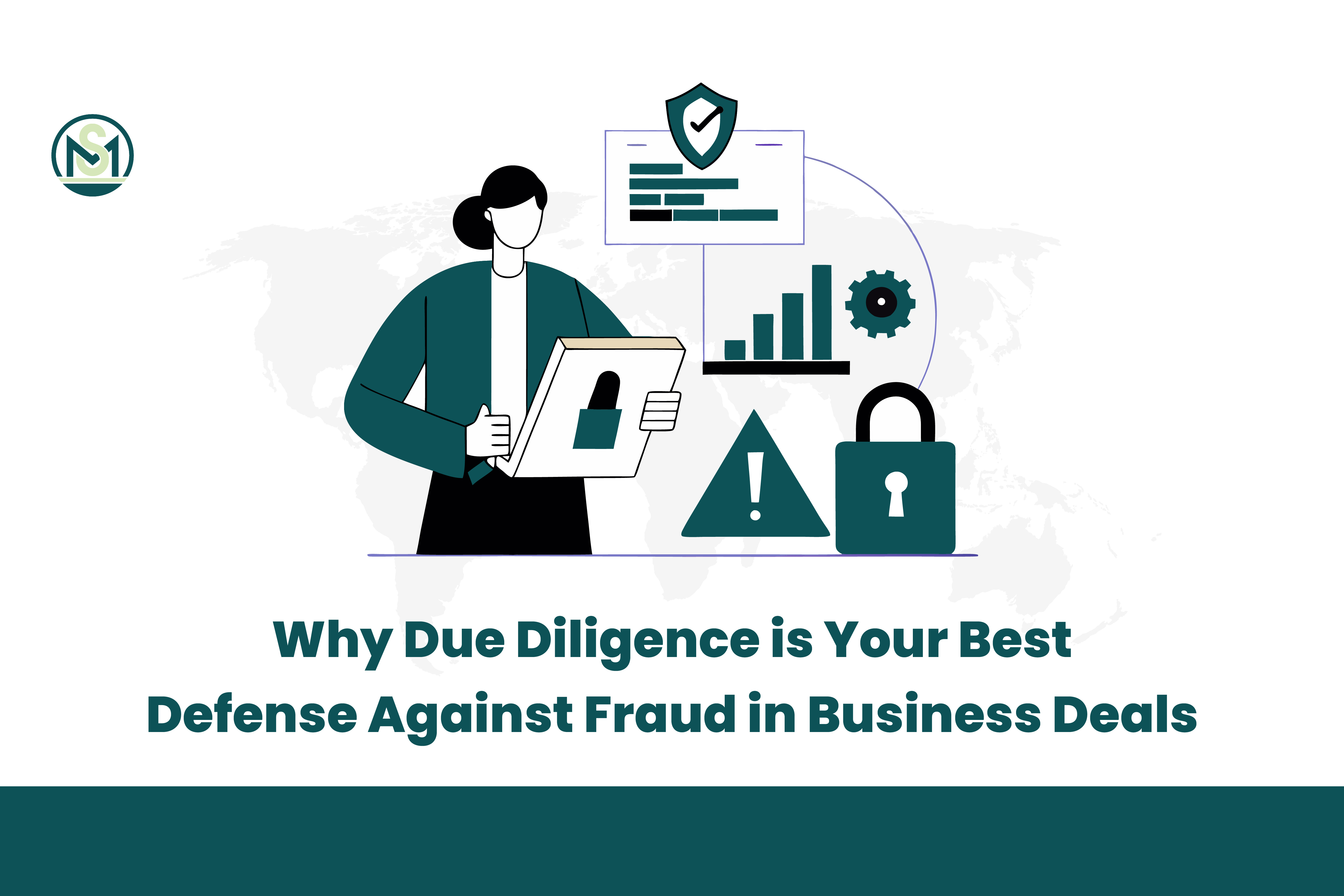In a competitive business environment, fraud poses a serious threat to businesses of all sizes. Whether you’re entering mergers, acquisitions, or any kind of partnership, Due Diligence is your best defense against potential fraud. By thoroughly vetting your business partners, investors, or acquisition targets, you can identify risks and avoid costly mistakes. It helps ensure that every aspect of a deal is carefully scrutinized before moving forward.
In this blog, we’ll explore the concept of Due Diligence, its importance in protecting against fraud, and how it can help businesses make informed decisions. From understanding what it is to discussing practical checklists and risk assessments, we’ll cover everything you need to know about this vital process.
What is Due Diligence?
It refers to the process of investigating and evaluating a potential business deal to ensure that all facts, figures, and assumptions presented are accurate and truthful. This process typically involves a comprehensive review of financial records, legal documents, contracts, and operations of the involved parties. By conducting Due Diligence, you can uncover hidden risks, financial discrepancies, and other red flags that could negatively impact your business.
The process is commonly used in mergers and acquisitions (M&A), investment opportunities, and partnership agreements. It helps businesses ensure they’re not being misled or taken advantage of. Whether you are considering buying a company, investing in a new project, or entering into a joint venture, It is essential for protecting your business from fraud and ensuring the integrity of your deals.
Role of Due Diligence in Fraud Prevention
Fraud is one of the leading causes of financial loss in business transactions. Whether it’s misrepresentation of financial data, hidden liabilities, or legal complications, fraudulent activities can cause significant harm to companies. It acts as a protective measure by identifying potential issues early on, allowing businesses to make well-informed decisions.
The main role of Due Diligence is to identify risks and mitigate them before they escalate into serious problems. A thorough investigation into a company’s financials, operations, and legal standing can reveal any inconsistencies, making it possible to address them before finalizing a deal. This process is crucial in preventing fraud and ensuring that you’re entering into a legitimate and safe business relationship.
Company Due Diligence Checklist: The First Step in Protecting Your Business
When conducting Due Diligence, it’s important to have a company due diligence checklist to ensure that no important detail is overlooked. A well-organized checklist will help guide your investigation and provide a comprehensive framework to assess every aspect of the company. Below is a sample company due diligence checklist that covers key areas you need to review:
Financial Records
- Review financial statements for the last 3–5 years
- Examine cash flow statements, profit margins, and debt levels
- Assess the accuracy of the company’s financial reporting
Legal and Compliance
- Check for any ongoing or past legal disputes
- Review contracts with suppliers, customers, and employees
- Ensure compliance with local, regional, and international regulations
Operational Review
- Evaluate the company’s operational processes and efficiency
- Review the supply chain for any weaknesses or risks
- Assess the company’s intellectual property, patents, and licenses
Market and Industry Review
- Analyze market trends and the company’s position in the industry
- Review competitor analysis and business growth projections
- Understand customer satisfaction and brand reputation
By following a detailed company due diligence checklist, businesses can ensure they are fully aware of the company’s standing before proceeding with any deal. This is the first step in identifying potential fraud and protecting your investment.

Financial Due Diligence Checklist: A Deeper Dive Into Financial Health
Financial Due Diligence is perhaps the most important part of the process, especially when it comes to preventing fraud. Without a clear understanding of a company’s financial health, you risk being blindsided by hidden liabilities or inflated revenue figures. A financial due diligence checklist helps you evaluate the accuracy of financial statements, assess cash flow, and ensure that the business is financially stable.
Here’s a breakdown of the key areas to include in your financial due diligence checklist:
Balance Sheet Review
- Assess assets, liabilities, and equity positions
- Identify any hidden liabilities, debts, or contingent liabilities
- Evaluate the company’s working capital and liquidity
Profit and Loss (P&L) Statement
- Analyze revenue streams and profitability
- Review any unusual transactions or adjustments
- Identify key drivers of profit and loss
Tax Compliance
- Check tax filings for accuracy and timeliness
- Review any past or potential tax disputes or audits
- Ensure the company is compliant with FBR tax compliance
Debt and Financing
- Review current and outstanding debt obligations
- Analyze interest rates, payment schedules, and covenant terms
- Assess the risk of default or financial strain
With a solid financial due diligence checklist, you can identify financial risks that could be signs of fraud or mismanagement. Ensuring accurate financial reporting is key to making safe, informed business decisions.
How to Conduct Due Diligence on a Company
How to conduct due diligence on a company is a common question for anyone entering into a new business deal. While the specifics may vary depending on the deal’s nature, the core process remains the same. Here’s a step-by-step guide on how to conduct due diligence on a company:
- Set Clear Objectives: Define what you hope to achieve with the due diligence process. Whether you’re evaluating a potential acquisition or investment, clear goals will help you stay focused.
- Gather Relevant Documents: Start by collecting essential documents such as financial statements, contracts, business licenses, and legal filings. This information will serve as the foundation of your investigation.
- Review Financials: Use a financial due diligence checklist to evaluate the company’s financial health. Look for inconsistencies in revenue figures, hidden liabilities, or financial red flags that could indicate fraud.
- Legal and Compliance Review: Ensure the company is compliant with all relevant laws and regulations. Investigate any pending lawsuits, unresolved legal disputes, or issues related to intellectual property.
- Evaluate Management and Operations: Assess the company’s leadership team, organizational structure, and operational processes. The strength of the management team can have a significant impact on the company’s success.
- Assess Risk Factors: Use due diligence risk assessment tools to identify potential risks, including market instability, competitive threats, or regulatory changes.
By following this structured approach, you can conduct due diligence effectively, ensuring that you make informed decisions and avoid potential fraud.
Due Diligence Valuation: Ensuring Accurate Company Value
One of the critical aspects of due diligence is due diligence valuation. This process involves determining the value of a company, which helps investors and acquirers assess whether the price being offered is fair. A Chartered Accountant plays a key role in this process, as they can assess the company’s financial performance, market position, and growth potential to provide an accurate valuation.
In this valuation involves reviewing financial documents, market conditions, and future earnings projections to assess the company’s worth. A thorough valuation helps avoid overpaying for an acquisition and ensures you understand the company’s financial standing before making any commitments.
How Msafdar Can Help
At Msafdar, we specialize in Due Diligence and can guide you through every step of the process. Whether you are looking to assess the financial health of a potential acquisition, review the risks associated with a new investment, or ensure FBR tax compliance, our team of Chartered Accountants is here to help.
We offer a wide range of Due Diligence services, including financial in Pakistan, it risk assessment, and due diligence valuation. With our expertise, you can be confident that your business deals are thoroughly vetted, protecting your interests and reducing the risk of fraud.
FAQs
What is due diligence?
It is the process of thoroughly evaluating a company or investment opportunity to identify potential risks, verify financial information, and assess overall feasibility.
How do I conduct due diligence on a company?
Start by reviewing financial statements, legal documents, business licenses, and key contracts. Use checklists like the company due diligence checklist to guide the process.
What is a due diligence audit?
A due diligence audit is an independent review of a company’s financial and operational records to verify the accuracy of the information provided and assess risks.
What are the benefits of due diligence?
The benefits of due diligence include reducing the risk of fraud, ensuring accurate valuations, identifying hidden liabilities, and making informed business decisions.
How can Msafdar help with due diligence?
Msafdar offers expert due diligence services, including financial due diligence in Pakistan, risk assessments, and business valuations, ensuring your investments and business deals are secure.



